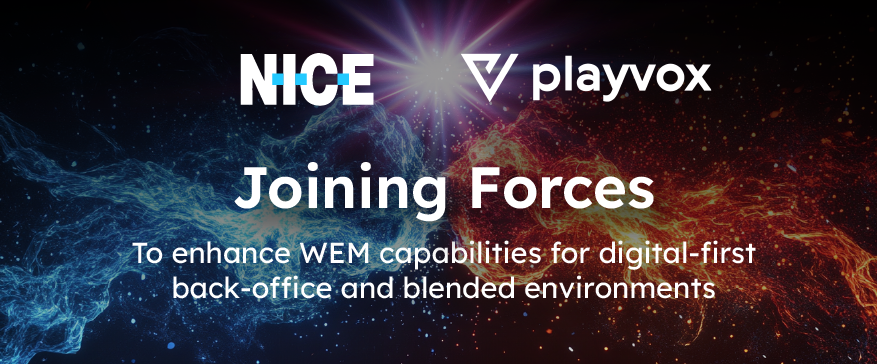Contact Center Agent Experience

Book a personalized demo with a Playvox expert
Great customer experiences are often characterized as being personalized, effortless, and frictionless. Contact center agent experience can be defined with these same characteristics. In fact, the two are intertwined — it’s impossible to provide outstanding customer experience when you aren’t delivering a stellar agent experience.
Contact centers that prioritize agent experience stand to gain huge benefits beyond customer experience, including lower attrition, increased engagement, improved efficiencies, and more.
What is Contact Center Agent Experience?
Agent experience or employee experience is the day-to-day reality contact center agents encounter in their work as they perform the tasks associated with their job. Training, technology, supervisors, schedules, customer interactions, company policies, processes, and other areas factor into the overall experience.
In modern contact centers, agent experience is further defined as follows.
Agent Engagement
Agent engagement is defined as the level of involvement, motivation, and emotional commitment contact center agents have toward their work, goals, and the company. The term is also used to describe how well technology solutions are engaging agents — does the solution support self-service time off requests, shift change requests, access to performance data, and access to learning materials to help self-improve?
Agent Empowerment
A level up from engagement in the pyramid is agent empowerment, which is when contact centers provide the necessary tools, resources, a positive work environment, and other factors to enable agents to perform to the best of their abilities. It involves giving agents the responsibility and autonomy to make key decisions when interacting with customers — and holds agents accountable for self-coaching and correcting in real time based on coaching and learning resources shared across platforms.
Why Agent Experience Matters
Agents are the face of the company and serve as brand ambassadors. Therefore it’s good business to focus on agent experience as the gateway to customer experience (CX). Happy agents yield happy customers. When you equip agents with the right training, tools, resources, and support, they are significantly more likely to deliver outstanding customer experience.
As another value-add for contact centers, great agent experience leads to higher retention rates — agents who are valued and empowered regard their job as a career and seek growth opportunities.
Omnichannel Support and the Agent Experience
Today, digital or online customer experience is critical to the overall seamless experience for customer satisfaction. Omnichannel support refers to the options customers have to interact with a company through various digital channels — phone, websites, mobile apps, social media, and online chat.
According to a recent Gartner survey on customer preferences, 62% of millennials and 75% of Gen-Z customers prefer self-service almost all the time, even when they can contact customer support. This compares to 19% of baby boomers and 43% of Gen X customers who report they would do the same.
Self-service can be a win-win for agents and customers. However, when you shift from phone to digital support, lower call volume doesn’t mean less effort for your agents. Yes, customers can provide self service for routine inquiries, but the remaining interactions that agents do handle will be the complex issues that require more advanced agent skills and knowledge and often involve multiple steps. Therefore, It’s important to have the right tools in place for successful omnichannel support.
Because customer service agents are no longer repeatedly answering basic, often mundane questions via phone, they will feel more engaged in solving more complex issues. And customers are empowered to easy answers whenever they need them, improving their satisfaction.
How Digital Transformation Impacts the Agent Experience
The shift toward digital solutions has revolutionized the brand experience for customers. Technology has the ability to do the same for agents by reducing or eliminating repetitive tasks which in turn enables agents to focus on more complex interactions with customers. Brands known for their outstanding CX delivery effectively combine people, data, and technology into a single, seamless, and empathetic experience. The same is true for agent experience.
Digital solutions arm contact center leaders and companies with valuable tools:
- Workforce Management AI solutions allow you to bring out the best in your employees. You’re able to manage operations efficiently, making capacity planning, forecasting, employee scheduling, and intraday planning easy, accurate, and far less time-consuming. Solutions also save hours on manual processes and unnecessary labor costs.
- Qualify Management technology lets you quickly and more easily understand what drives exceptional experience — for the agent and ultimately for the customer. For example, proactively analyze agent interactions to look for coaching opportunities and knowledge management that improve service and prevent costly issues. Integrated coaching helps you keep your whole team engaged to reduce agent attrition. Quality Management (QM) also helps you understand profiles and qualities that make up your best agents so you can find more team members like them, helping with the hiring process and onboarding process.
Benefits of Improving Contact Center Agent Experience
When you focus on improving the contact center agent experience, the rewards pay off tenfold.
Increased Agent Engagement
Agents who feel supported and empowered provide positive interactions and better CX because they are engaged. Simple yet powerful strategies to increase agent engagement include:
- Provide frequent training and feedback
- Embrace flexible work and work-life balance
- Pay agents fair wages
- Prioritize training, agent skill development, and career growth
- Encourage and demonstrate collaboration and communication
Reduced Agent Attrition
Contact center agent turnover rates across the industry continue to clock in between 30 and 45 percent annually, with no signs of improvement. For businesses, this revolving door creates significant efficiency, productivity, and financial challenges, not to mention the day-to-day impact on morale.
Understanding the reasons for attrition is the first step to reducing your rate — burnout and stress rank among the highest factors. The second step is putting processes and programs in place to boost agent retention. Read below for winning strategies to improve agent experience.
Improved Customer Experience
Common elements of positive customer experience are:
- Speed or efficiency
- Convenience
- Consistency
- Friendliness
Engaged, empowered agents have the ability to make or break any or all of these elements. Focusing on agent experience helps improve customer experience by exceeding customer expectations, reducing customer churn, and increasing customer loyalty.
Boosted Productivity
With the right tools, training, and support in place, agents are empowered to use valuable time to provide quality customer interactions and support. Fewer escalations and reduced contact center KPIs, like average handle time and first-contact resolution, result in higher agent efficiency and lower operational costs.
Workforce management tools can automate repetitive tasks, making it easier to scale your support operation.
How to Improve Contact Center Agent Experience
It’s well established that creating a great contact center agent experience is essential for boosting agent engagement, retention, productivity, and ultimately improving customer experience. With scarce budgets and resources, placing your eggs in the agent experience basket is a good way to improve your CX too.
Here are some strategies to enhance the contact center agent experience:
Embrace Automation
Artificial intelligence (AI)-infused contact center technologies automate and streamline tasks and improve agent efficiency. Here’s how they help contact center managers and agents:
- Improve your contact center operations with actionable insights.
- Empower your team with AI to handle monotonous tasks, allowing agents to focus on building meaningful customer connections.
- Gain insights into optimizing your workforce management.
Provide Consistent, Real-time Feedback and Coaching
Most agents want feedback so they can learn, grow, and improve. One way to provide feedback is by conducting consistent quality management evaluations. And don’t forget that feedback is a two-way street. Offer agents informal and formal opportunities to give feedback, and make sure you listen and act on that feedback to create positive experiences.
In addition to feedback, technology solutions make frequent coaching on agent performance and skills easier and more equitable. For example, you can deliver automated coaching recommendations based on evaluated interactions, build consistency between coaches, and reduce coaching effort by using templates. This allows every agent to benefit from the best ideas. Tracking how effective the coaching was and the impact also ensures you are making progress toward your goals.
Incorporate Gamification, Rewards, and Recognition
One strategy that drives motivation and creates a culture where agents continuously work to achieve the business objectives and, in turn, get rewarded and recognized is gamification. Gamification solutions offer a fun way to provide recognition. For example, you can give out badges related to company goals in a public forum. Public recognition for a job well done inspires higher performance and builds employee engagement, motivation, and agent morale.
Early on, set clear goals with milestones along the way. A recognition program that rewards contact center staff for achieving those goals can deliver the positive reinforcement needed to help keep the momentum going.
Increase Agent Training and Knowledge
Agents need timely, ongoing training for hard and soft skills — from building rapport and communication skills to product knowledge and techniques to successfully resolve queries on first contact. Each agent is in a different phase of their learning journey, and so contact center managers must create flexible training and knowledge programs to meet agents where they are. Get creative to support the different learning styles and preferences:
- Remote collaboration with managers and peers
- One-to-one video training with managers
- Robust knowledge base and online resources
- Gamification
Agents who are well-prepared and confident in their abilities can provide quicker, more accurate assistance, leading to higher customer satisfaction and loyalty throughout the customer journey. Ongoing training can also help agents stay engaged and provide a path toward advancement, reducing turnover and ensuring a high standard of service every time.
Leverage Automated Quality Management
Automated quality management, or AQM, can optimize the entire quality management process for contact centers through efficiency and effectiveness improvement. These solutions empower customer service organizations to focus on turning up employee performance by more closely tracking compliance with service standards. The ultimate result is a more consistent experience for customers and happier teams.
With a boost from AI, traditional quality management takes a giant step past basic process improvements to quickly expand and enhance team performance and agent engagement. AQM does more than simply identify areas for improvement — well-developed AQM solutions also facilitate targeted coaching and training programs for long-term impact.
Implement Metrics and Reporting
It’s difficult to improve what you can’t measure; therefore take the time to set up key performance indicators (KPIs) and contact center metrics, including customer satisfaction scores and net promoter scores, to benchmark the starting point to improve agent experience.
Call center leaders are under increased pressure to improve operational and agent efficiencies and look for cost-cutting opportunities while delivering exceptional customer experiences — a tricky balancing act for sure. Understanding the key call center efficiency metrics to track, and more importantly, how to improve them will set you up for success, keep your agents engaged, and provide impactful customer service.
As companies shift the focus to a CX culture, improving the contact center agent experience is a great area to prioritize. More engaged and empowered agents deliver better customer experience, and as an added bonus, your organization is rewarded with less agent turnover and happier agents and happier customers.



